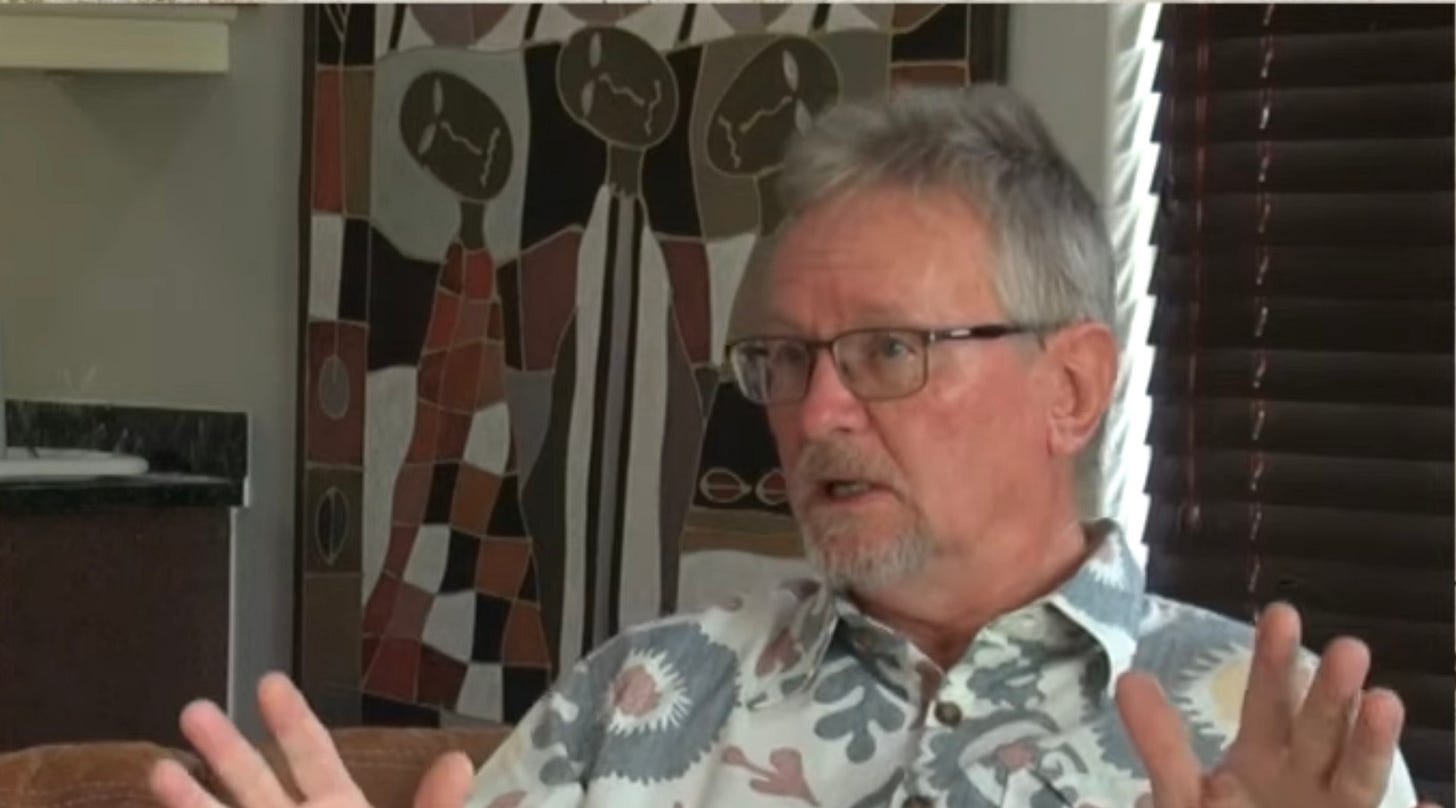Do you believe people can change? Really change? Not just their mind, but their whole approach to life?
This question feels like it’s been haunting me these last weeks, showing up in everything I read and everyone I speak to. I believe it to be a keystone question as we seek to stay loyal to our values and build spiritual core strength. It is one of those positions from which many other things follow.
Firstly, I spoke to the fascinating
for The Sacred podcast. Clementine is an essayist and zine maker who writes on trauma, addiction, polyamory, veganism and more but is perhaps best known as a leftist critic of cancel culture. Her key critique is that the punitive strand in the ‘social justice culture’ she was a part of rests on a disbelief in the possibility of change. Recovery led her to a different perspective:In Alcoholics Anonymous, we learned that people can change and that the way that people change is through being in community, being seen for their true self. People do fucked up things because of how much pain they’re in. When they actually have the opportunity to connect with a community that sees them…that their lives are not garbage, that they deserve to come back into the fold….People do change. That’s something that I really deeply believe in.
Secondly, it was raised in a conversation I took part in with Richard Spoor, one of South Africa’s leading human rights lawyers and a campaigner against apartheid and for the protection of workers. He’s recently had an intense conversion experience. A man who was a hard boiled, materialist atheist and former revolutionary Marxist is now part of a church and has a deep sense of divine love and what he calls “forgiven-ness”. Interestingly, he credits part of this journey to one lone (traumatic) experience with psilocybin. He said “it was not the religious experience, but it facilitated the experience” which came afterwards. (More details coming soon of an event I’ll be hosting on these themes).
One of the many dramatic changes Richard narrates in his life is around my keystone question. He spent six decades concluding “change is impossible. I can’t change”, and, nor, really, can other people. Tricky for a life long campaigner. Post religious experience, he now thinks transformation is possible and this has flipped upside down how he sees others people and the world.
Believing people can (and do) change is a faith position. Like (honestly) the existence of a loving God, it is hard to make a definitive case in left-hemispheric, watertight ways. Some data point one way, some another. A lot of your perspective will be framed by your experience.
I think it’s a leap of faith worth making. When we believe that no one is irredeemable, that some good resides even in those we find heinous and incomprehensible, we show up with a different posture. We are more able to be open and curious. The presuppositions we bring into the world shape everything, and when we think people can change we look for evidence of that. We are more likely to find what we are looking for.
And, as Clementine says, our ability to change is affected by the expectations of our community. The 12 Steps movement is powerfully transformational because it has faith in people. It tells addicts (who have often spent decades wanting to change and failing) that they are believed in. They are welcomed, no matter what they have done, and find others to walk alongside them. AA doesn’t pretend change is easy, but the rituals and collective storytelling show again and again that it is possible. For anyone. And this container of grace and patience, faith and encouragement is necessary for the excruciating vulnerability of attempting to live differently.
Conversely, a society that writes people off and exiles them with social censure tends to harden our crust of self-defence. As Richard Spoor describes, apathy, cynicism and even nihilism can result. Why bother to defy expectations? Vulnerability dies in these conditions, and so of course change doesn’t happen. Compassion is what motivates it, not contempt.
This compassion, this faith, matters for individuals, and without it we can’t build a liveable common life. In his very persuasive book The Persuaders: Winning Hearts and Minds in a Divided Age, Anand Giridharadas(
)argues that our tendency to “write people off” is hindering efforts to create a juster, fairer, freer world for us all. The book opens with a startling and sobering account of interference by Russian agencies in US public life from 2014 onwards.The investment in the project seemed to reflect a calculation by a highly capable foreign intelligence service that, of all the vulnerabilities of modern American society, the particular civic attitude that the project sought to inflame, writing people off - assuming they would never change their minds or ways, dismissing them as hopelessly mired in identities they couldn’t escape, viewing those who thought differently as needing to be resisted rather than won over, refusing to engage in the work of persuasion - was an Achilles heel.
In other words, Russia sought to undermine democracy by making it harder and harder to keep faith in each other.
When we lose this faith, we also lose faith in institutions, politics, the whole delicate web of connections we call our common life. We stop doing the work of citizenship and turn instead to factionalism. The Russian troll farm which pumped out divisive content (from all political perspectives, not just the right) was seeking to continually reinforce a picture of human beings as “immovable, brainwashed, of bad faith, not worth energy, disloyal…these people are not to be trusted. They will never change. They are who they are. And who they are is a risk to your being”. Whether it is precision designed in troll farms or “organic” expressions from all of us accidental combatants in the culture wars, a belief in the unchangeability of other people is kryptonite. It corrodes communities as surely as contempt corrodes marriages.
Giridharadas quotes Loretta Ross, a life long activist, recalling attempts by the FBI in the 1960s to infiltrate civil rights organisations and destabilise them by telling lies, with the goal “to try to splinter us apart, to make us turn on each other”. When we let ourselves believe the story that some people and tribes are beyond the pale, unchangable, worthy of writing off, we become collaborators.
I want to be a conscientious objector to the culture wars. I want to hold fast to a belief in the dignity, preciousness, humanity and yes, changeability of people who don’t just disagree with me but may even hate me, no matter their political position, identity, age or anything else. I believe it because my tradition teaches me to, but also because it is better for us all when we do.
Let me end with a challenge for you, which I also need. Who is a person, group or position that you feel contempt for? Could you soften your heart to them, just a bit? Imagine them as changeable? If if works for you, you could pray a blessing for them (love your enemies and pray for those who persecute you, is the crazy-hard call of my scriptures) or hold them in a loving-kindness meditation. Or you could just vow to keep faith in them, to seek to see the best in them, even while you may need to fight their ideas or institutions. It’s not about being “nice”, or soft. It is the only way we make space for transformation.







"Conscientious Objector to the Culture Wars". Love that. I am in.
Thank you again for working with me in helping Richard Spoor tell his story.
I am looking forward to what else you have to share on the psychedelics issue. My right brain dominant friends have a list of people they want to send on a magic mushrooms trip, because of their obstinacy and small mindedness. But seems the challenge is rather to keep embracing them in love.
Thank you for this thoughtful offering. The people that I struggle to love, to like, and oftentimes even to consider human are those with the greatest wealth. I don't understand how it's possible to accumulate a billion pounds and remain human. There are so many crises the 1% could ameliorate. So much global suffering they could ease. Yet they hoard, and build cryogenic chambers and rockets. They actively cause more harm to all creatures. What are your thoughts on this? What does loving these people look like? Do you have any advice?!